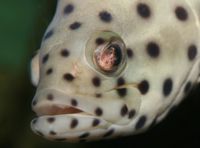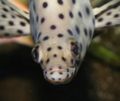Panther Grouper (Cromileptes altivelis)
From The Aquarium Wiki
(Redirected from Highfinned Grouper)
Panther Grouper
Cromileptes altivelis
946 Litres (250 US G.)
63.5-68.6cm (25-27 ")
8.1 - 8.4
22.2-25.6°C (72 -78 °F)
8-12 °d
1:1 M:F
8-12 years
Family
Serranidae
This animal is available captive bred
Contents
Additional names
- Panther Grouper, Pantherfish, Humpback Grouper, Humpback Sea Bass, Polkadot Grouper, Barramundi Cod, Flatfish Grouper, Barramundi Rock-Cod, Highfinned Grouper, High-Finned Grouper, Plum Pudding Cod, Polka Dot Grouper
Additional scientific names
- Chromileptes altivelis, Cromileptis altivales, Cromileptis altiveles, Cromileptis altivelis, Epinephelus altivelis, Serranus altivelis
Origin[edit]
- Found in the Western Pacific, from southern Japan to Palau, Guam, New Caledonia and southern Queensland, Australia. Eastern Indian Ocean: Nicobar Islands to Broome, Western Australia.
Sexing[edit]
- It is very difficult to visually sex these fish and they are not known to be bred in captivity.
Tank compatibility[edit]
- This fish is not typically reef-compatible as it will see smaller fish and invertebrates as food. However, all fish are slightly different and may not act as predicted.They will not tolerate other Groupers and should only be kept with robust fast-swimming tank mates (so they are not out-competed to food by the Grouper) such as some Tangs, Angelfish, Wrasses and Triggerfish.
Diet[edit]
- This fish has a huge appetite and will eat and eat if given the opportunity to. They prefer a variety of meaty seafood such as shrimp, mussels, cockles, fish fillets, clams and scallops. You can add vitamins and highly unsaturated fatty acids to their diet by soaking freeze-dried krill with supplements such as Zoe and Selcon. They should not be fed feeder fish.
Feeding regime[edit]
- Feed once or twice a day.
Environment specifics[edit]
- This fish is a heavy waste producer so excellent filtration and a powerful protein skimmer is a must as they are also sensitive to water quality issues.
Behaviour[edit]
- An active, fast swimming, curious fish that will be aggressive towards others of its own kind, and will bully any newcomers to its territory. They are known to beg for food and are reactive to the goings on outside the tank.
Identification[edit]
- An attractive and striking large fish. The body is mottled and pale in base colour and covered all over, including the fins, with black/brown spots.
Pictures[edit]
Videos[edit]
| Juvenile eating a Lancefish: | Wild Panther Grouper: |
External links[edit]
- Fishbase (Mirrors:
 )
)



